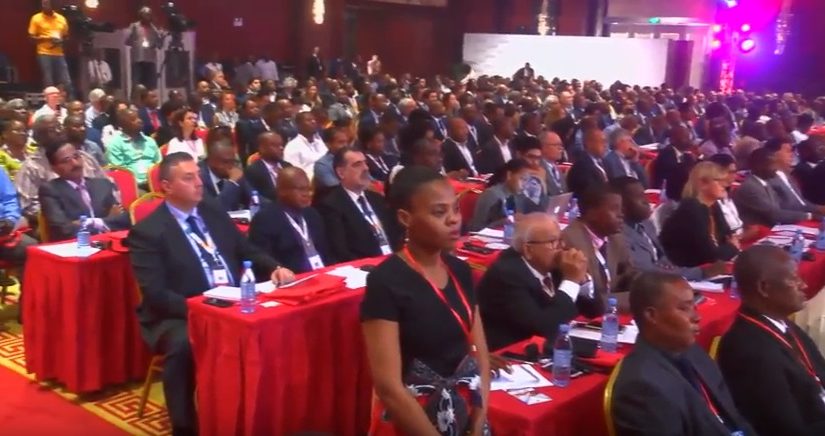Mozambique: Aluminium export revenues nearly double YoY in Q1, reaching US$380.7 million
Mozambique: PM promises pro-business legislative reforms

Photo: Miramar
Mozambican Prime Minster Carlos Agostinho do Rosario on Monday pledged that the government will do all in its power “to continue creating a macro-economic and regulatory environment that favours the growth and competitiveness of the national business sector”.
Speaking at the closing session of the Annual Conference of the Private Sector (CASP), Rosario said the government is committed to reforming, in the near future, the country’s labour legislation, the law on bankruptcy, the Commercial Code, the building registry code, and the code on legal costs.
He added that the government is also committed to concluding a proposal on “national content”, which he believed “will create more opportunities for Mozambican business people to increase their participation in the economy through the linkage of the mega-projects with the rest of the national economy”.
It has been a recurrent complaint of local businesses that they are excluded from contracts to provide goods and services for the foreign investment mega-projects.
Rosario added that the government is finalising a Strategy for Improving the Business Environment, updating its Commercial Policy and Strategy, and reviewing its Land Policy. He said the revised land policy “should make this resource increasingly an instrument at the service of the country’s economic and social development”.
The Prime Minister also promised that this year the government will set up the High Authority for the Extractive Industry (AAIE). This is a body envisaged by the Mining Law passed by the Mozambican parliament, the Assembly f the Republic, in 2014. Four years have passed and the AAIE is not yet a reality.
But Rosario declared that the AAIE will “ensure greater benefits from the exploitation of the country’s mineral resources, and greater integration and participation of national content in the extractive industry”.
Rosario promised that the State will this year begin paying off its debts to private companies. He said the 2018 State Budget contains a sum of 2.7 billion meticais (about 43.5 million US dollars) which will cover just 17 per cent of the State’s debt to private suppliers.
One of the main complaints raised at the opening of the Conference by Agostinho Vuma, chairperson of the Confederation of Mozambican Business Associations (CTA) was that the State does not pay its debts on time This, plus delays in reimbursing Value Added Tax (VAT), had worsened the difficulties faced by companies in 2017.
Rosario stressed that the empowerment of the private sector, and particularly of Small and Medium Enterprises (SMEs), relies on investing in human capital, which made reform of technical and professional education a priority.
“Implementing the reform of technical education will ensure that Mozambican workers are endowed with know-how, so that they can be competitive on the labour market”, he said.
The Prime Minister stressed the willingness of the government “to continue improving the mechanisms of dialogue, legislation, and regulation, under the activities agreed with the private sector. We are sure that all of us will play our roles to make Public-Private Dialogue in Mozambique vigorous, robust and sustainable”.
Rosario’s closing speech did not address all the concerns expressed by private business. Vuma had called for greater protection for Mozambican agriculture, particularly for the country’s rice producers. Mozambican farmers, he said, “cannot compete with rice imported from Thailand when the import duty on rice is only 7.5 per cent”.
He also attacked the insistence of the Mozambican Tax Authority (AT) to introduce fiscal stamps on beer, a measure which is at best irrelevant, since 95 per cent of the beer consumed in the country comes from a Mozambican company, CDM, which nobody suspects of tax evasion. Just five per cent of the beer consumed comes from the informal sector. The AT’s demand will impose extra costs on CDM which will doubtless be passed on to the consumer.
“Our question is: does it make sense to sacrifice the 95 per cent that is in the formal sector, to seek control over the five per cent that is informal?”, said Vuma.
On the land question, Vuma called for a market in land titles (known as DUATs). The Mozambican constitution and the Land Law forbid the sale, purchase, mortgaging or any other form of alienation of land, but Vuma did not see why this should prevent DUATs from being transferred.
“By facilitating such transferability, we can create a market in land use rights, not a market in land itself, since the State remains the owner of the land, and this principle will remain unquestionable”, said Vuma. “The result will be a more efficient allocation of land to individuals and companies with the capital and capacity to make the land more productive”.












Leave a Reply
Be the First to Comment!
You must be logged in to post a comment.
You must be logged in to post a comment.